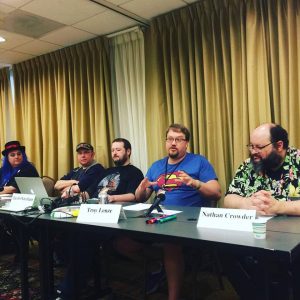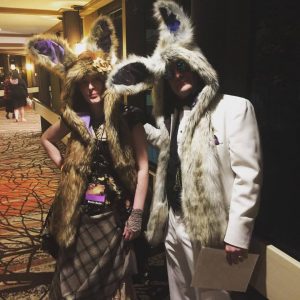It’s Tuesday after the 40th annual Norwescon, held in beautiful and scenic Seatac. While it’s fresh in my mind, I thought I’d jot down a few notes since there had been some interest in things I learned.
Norwescon is one of the largest regional SF/F conventions in the US, according to Wikipedia. It runs every Easter weekend. I was there as a panelist, mostly discussing comic books and gaming. But I also contributed to the Fairwood Writers Workshop, which pairs a panel of pros with a new author looking for feedback on their writing.
One new thing I did this year was participate in the Gamemaster’s Manifesto podcast, run by Jacob Osterhaus and Troy Lenze. They did a total of three panels for their podcast, with a different set of gamer panelists in each. I was in the panel called “Put Your Phone Down!” Based on the title, I was certain I was going to be a lone voice in favor of electronic devices at the gaming table. But there were some very positive comments about the role technology can play in enhancing the gaming experience. OrcaCon organizer Donna Prior and Dylan Templar from Green Ronin were on my panel and had lots of great things to say. What kind of great things? Well, you’ll have to wait for the podcast. Other podcasts that weekend included people like game designers Ogre Whiteside, Veronica Hamilton, and Phil Brucato, and author Nathan Crowder.

Panelists for The GameMaster’s Manifesto Podcast – GMing From The Hip
The always lovely Lee Moyer gave a talk on branding as an author. I’m still processing some of what he had to say about web presence. He opened with some basic stuff: choosing the name you write under, choosing a memorable website address, how your marketing materials reflect your brand. Since I’ve been doing this for a while, it left me anxious about whether I’ve been doing it all wrong. Is “Jeremy Zimmerman” the name I should be writing as? Is it too long? Is bolthy.com too weird of a domain name? I’ve been using it for almost 20 years, long before I took writing seriously. Has that been a mistake? None of this anxiety is Lee’s fault. I’m just an anxious guy in general. And I’ve been having some authorial existential angst.
A big chunk of the time was spent discussing cover art, including a Powerpoint slide show of good covers and not-so-good covers. I learned the term “line design,” which is about having a consistent look throughout your covers in a series. It left me wondering if our mix of cover styles for Mad Scientist Journal has been a mistake. He also highlighted some challenges with common cover themes and the perils of using stock art. Apparently a lot of books have figures in black hooded robes. Some even use the same stock image. Some of these were traditionally published novels by big publishers.
Sadly it didn’t get into one thing described in the program: choosing five words that you want people to think of when you enter a room, and how to include that in your branding. Which is just as well: trying to imagine what those five words are just causes me to freeze up.
Another panel I attended was “Advanced Self Publishing.” It was moderated by Tori Centanni and included Annie Bellet, Mark Teppo, Elliott Kay, and K. M. Alexander. The biggest advice they had was to get the next book out there. They framed it as a numbers game: you have a better chance at making money with four books a year than one book every year or two. It also tied into gaming Amazon’s system. New books in a series boost sales for the rest of the books in a series. It keeps the successful books appearing in recommendations. There are drop-offs for recommendation lists that hit at 30, 60, and 90 days.
Several books had been recommended, which I jotted down. They were recommended by some of the panelists, but I cannot vouch for their quality. I’m dubious about self-help books, but these may be different.
- 2k to 10k: Writing Faster, Writing Better, and Writing More of What You Love by Rachel Aaron
- Let’s Get Digital: How To Self-Publish, And Why You Should by David Gaughran
- Let’s Get Visible: How To Get Noticed And Sell More Books by David Gaughran
- For Love or Money: The How to Guide For Crafting a Career as a Self-Published Author by S.K. Quinn
- Indie Author Survival Guide by S.K. Quinn
Worth noting is the Broad Universe Rapid Fire Reading. Broad Universe is an organization built around promoting women in the SFF genre. I also have learned that they are welcoming of non-binary people and men. They offered a two-hour block Saturday night, featuring several amazing authors and giveaways throughout the evening. Featured authors included Marta Murvosh, Brenda Carre, Carol Berg, Jude-Marie Green, Cat Rambo, J Tullos Henning, Chrysoula Tzavelas, Dawn Vogel, Janka Hobbs, and Krista Wallace. There was also a reading in honor of S. A. Bolich.
The strangest moment of the weekend came close to midnight on Saturday night. I was a little tipsy and utterly exhausted when I encountered two people dressed in bunny-ish costumes. As they passed people they asked, “Do you want candy from a stranger?”
In a way, it isn’t too weird for strangely dressed people at a convention filled with cosplayers and SCA types. But I was so out of it, all I could think is, “This is the beginning of either a roleplaying game or an urban fantasy novel.” If I hadn’t been careful, I was sure they’d take me off to Wonderland or something stranger.
I took their picture just so I could be sure that I hadn’t just hallucinated the whole thing.

“Bunnies! Bunnies! It must be bunnies!”




Hmm. I didn’t realize you used bolthy.com as your writing business website. I thought is was a personal site. The fact that a person who hears about a kensei book can’t go to “kenseiadventures.com” or “JZauthor.com” or whatever does actually seem like a problem to me. You can always have both, show a link to your personal and game blog in the book site, but I’d agree with your niggling feeling that bolthy.com isn’t serving you as a working author.
On the other hand, I think Mad Scientist Journal, as a periodical, is just fine having different art styles on different issues. That actually enhances it, to me, because every issue has that new discovery :-)
It’s not unheard of for an author to have a weird domain name. Cat Rambo, for example, has been kittywumpus.net for time out of mind. But it’s certainly uncommon. Plus, she owns Catrambo.com and it points to kittywumpus.net.
I hadn’t decided to drop “Bolthy” from my by-line for fiction until the very last minute. I’ve been Bolthy online for 20 years in one form or another, so I’ve never changed that. It’s on most of my social media presence, and I use it for every person project.
When I moved away from Livejournal for blogging, I debated whether I should continue to blog about gaming somewhere separate from blogging. Opinions from the peanut gallery at the time was that they’d be more interested in a blog that covered more than one thing. It’s definitely easier to manage one online persona rather than two. Or three. Or four. Even maintaining Mad Scientist Journal as a separate entity is a pain in the ass.
But on the flip side it potentially dilutes my “brand identity.” But I’m not sure how to separate all these different projects out into distinct presences.
I’m also not sure what I’d actually want instead. Certainly not Kensei. I don’t want to only be known for that. Someone is squatting jeremyzimmerman.com and offers it for sale for $850 I don’t have. It’s also reeeeally long. And I also struggle with the question: is anyone going to just put in myname.com? Or will they just google it?
In terms of search engines, bolthy.com is certainly the first thing related to me that comes up when you just search my name. There’s actually a big deal casting director named Jeremy Zimmerman, and he beats me out on search engines. But “jeremy zimmerman writer” typically pulls up all my Bolthy stuff.